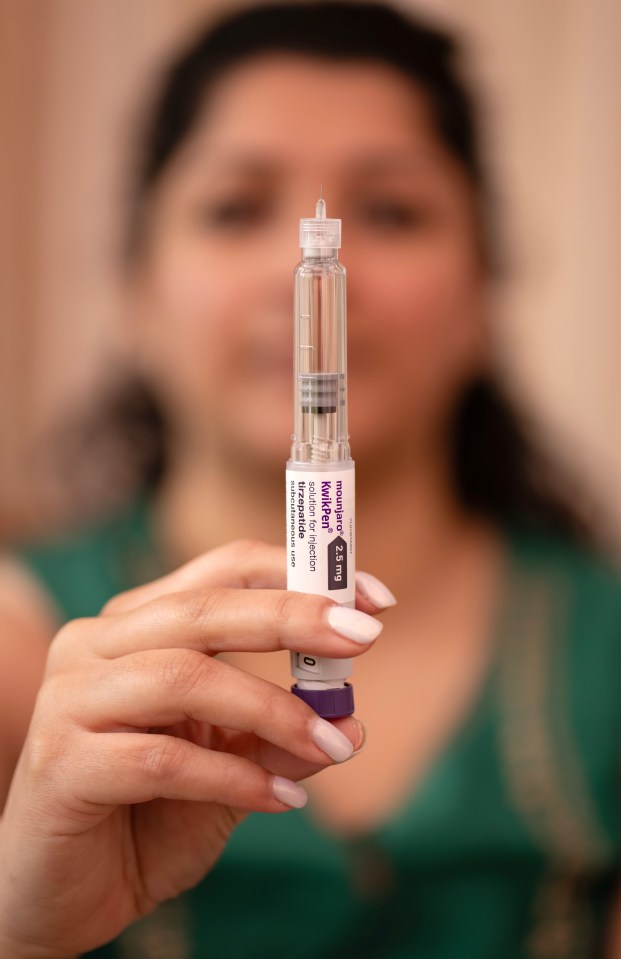WOMEN on fat jabs must take effective contraception, health chiefs have warned for the first time.
It comes amid claims of an ‘Ozempic baby boom’ – with more women becoming pregnant while using weight-loss injections like Wegovy and Mounjaro.
To date, the Medicines and Healthcare products Agency (MHRA) has received more than 40 pregnancy-related reports involving the jabs, with women online raising fears after discovering they’re pregnant while taking the drugs.
Now, top doctors say the drugs must not be used during pregnancy, while trying to conceive or breastfeeding, over fears they could lead to miscarriage or birth defects.
The MHRA said today: “This is because there is not enough safety data to know whether taking the medicine could cause harm to the baby.”
Dr Bassel Wattar, a consultant gynaecologist and medical director of clinical trials at Anglia Ruskin University, told The Sun: “It’s not the medication itself, but the weight loss that helps regulate a woman’s hormones allowing her ovaries to function properly again.
“Pregnancy is more of a happy side effect.”
What’s more, it is thought that GLP-1 drugs could reduce the absorption of contraceptives, due to the fact they slow down the emptying of the stomach.
Professor Rebecca Reynolds from the University of Edinburgh warned we don’t fully understand the effects these drugs could have on an unborn baby, due to a lack of scientific evidence.
She said: “There is hardly any available data from human studies to be able to advise if these weight loss drugs are safe in pregnancy.
“The data from animal studies suggest the potential for harm with low birth weight and skeletal abnormalities, though more evidence is needed to assess if there are risks of taking these drugs in pregnant humans.”
Dr Wattar added it is rare for pregnant women to be involved in trials like this, due to the fact it can be “riskier and more expensive”.
Studies on pregnant rats showed semaglutide – the active drug in Wegovy and Ozempic – caused early pregnancy loss and birth defects.
Meanwhile, similar results were seen in rabbits and monkeys, with miscarriages and developmental issues found in offspring.
The MHRA says women should use reliable contraception if they are taking GLP-1 weight-loss injections, and for up to two months between stopping the jabs and trying to get pregnant.
That means women should take either the oral pill or non-oral options, the implant, coil or use condoms effectively.
The MHRA guidance also warns those specifically taking Mounjaro to use a non-oral method of contraception after studies found the active drug tirzepatide may reduce the effectiveness of oral contraceptives in women who are overweight.
Dr Alison Cave, from the Medicines and Healthcare products Regulatory Agency (MHRA), said: “This guidance should not be used as a substitute for reading the patient information leaflet or having a conversation with a healthcare professional as part of the prescribing process.”
‘The power to harm as well as to heal’
The warning comes as the jabs fuel a boom in demand, with community pharmacies seeing a surge in requests.
Jasmine Shah, of the National Pharmacy Association (NPA), said: “Medicines are not like ordinary goods for sale, they must be handled with great care because they have the power to harm as well as to heal.”
Officials also warned against buying the jabs from dodgy sellers online or in beauty salons, where fake or unsafe products could pose a serious risk.
Stop the injections if you’re pregnant
DR Zoe Williams is The Sun’s resident GP.
Q: What if I am pregnant and taking fat jabs?
The fact these drugs suppress appetite means the majority of women who got pregnant on them will have come off, because they are nourishing their baby.
The advice is to come off them immediately if you’re either pregnant or breastfeeding and speak to your doctor if you have any concerns.
Q: Why has this advice been issued now?
It is because not enough is known about the effect on pregnancy.
It’s not from studies that found any adverse effects.
As a result, the advice is preventative until more is known.
If women are on any weight loss jabs and want a baby, the advice is to come off it at least two months before trying.
Q: Are fat jabs going to be the ‘new thalidomide’ scandal?
No, the GLP-1 drugs are peptides that work by mimicking existing proteins in our bodies. In contrast, thalidomide is a drug that can affect blood vessel growth.
It is not likely that the jabs would cause such significant birth defects, as seen with thalidomide.
So far there has been no evidence of danger to the baby, despite many women getting pregnant on them.
Q: I’m worried and don’t know what to do?
When news like this breaks, it is common to have patients get in touch with concerns.
Stop taking the medication.
But be reassured, there is nothing your GP or midwife will need to do urgently.
If they are really concerned, they will get in touch.
Anyone concerned about side effects, including severe stomach pain that radiates to the back, a sign of pancreatitis, should seek medical help immediately.
GLP-1 drugs work by mimicking hormones that make you feel full, and some, like Mounjaro, also target blood sugar control.
A spokesperson for Novo Nordisk that makes Wegovy and Ozempic, told The Sun: “There is limited data with semaglutide use in pregnant women to inform a drug-associated risk for adverse maternal and foetal outcomes.
“Semaglutide should be discontinued in women at least two months before a planned pregnancy due to the long washout period.
“Semaglutide should not be used in pregnancy. Women of childbearing potential are recommended to use contraception when treated with semaglutide.
“In other pharmacology trials, semaglutide did not affect the absorption of oral medications (including the oral contraceptive medication ethinylestradiol and levonorgestrel) to any clinically relevant degree.
“Therefore semaglutide is not anticipated to decrease the effect of oral contraceptives.
“Nonetheless, caution should be exercised when oral medications are concomitantly administered with semaglutide.”
What are the other side effects of weight loss jabs?
Like any medication, weight loss jabs can have side effects.
Common side effects of injections such as Ozempic include:
Nausea: This is the most commonly reported side effect, especially when first starting the medication. It often decreases over time as your body adjusts.
Vomiting: Can occur, often in conjunction with nausea.
Diarrhea: Some people experience gastrointestinal upset.
Constipation: Some individuals may also experience constipation.
Stomach pain or discomfort: Some people may experience abdominal pain or discomfort.
Reduced appetite: This is often a desired effect for people using Ozempic for weight loss.
Indigestion: Can cause a feeling of bloating or discomfort after eating.
Serious side effects can also include:
Pancreatitis: In rare cases, Ozempic may increase the risk of inflammation of the pancreas, known as pancreatitis, which can cause severe stomach pain, nausea, and vomiting.
Kidney problems: There have been reports of kidney issues, including kidney failure, though this is uncommon.
Thyroid tumors: There’s a potential increased risk of thyroid cancer, although this risk is based on animal studies. It is not confirmed in humans, but people with a history of thyroid cancer should avoid Ozempic.
Vision problems: Rapid changes in blood sugar levels may affect vision, and some people have reported blurry vision when taking Ozempic.
Hypoglycemia (low blood sugar): Especially if used with other medications like sulfonylureas or insulin.















